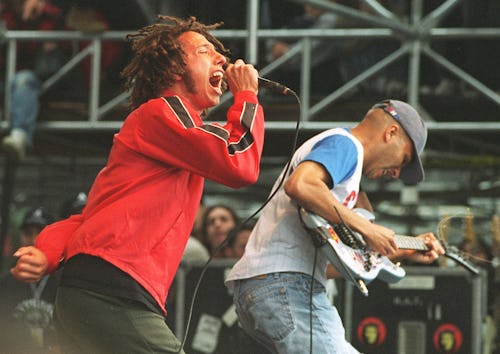Coachella is hustling backwards by reversing its vaccine mandate
And it's not the only music festival that's making this mistake.

Coachella had a chance to be a leader, and it decided to follow the wrong trends. Festival organizers Goldenvoice not only changed its vaccine mandate to allow unvaccinated people to attend Coachella, but also extended this courtesy to anyone coming to any of its upcoming festivals over the next seven months in a reversal that is as confusing as it is harmful.
The festival now will allow people who show a negative COVID-19 test within 72 hours of the event to attend, and shared the health policy update in an Instagram story posted to the festival’s official page around 4 P.M ET/1 PM PT Tuesday. According to the post, the festival reversed course on requiring full vaccination for all attendees due to “low transmission data and successful implementation of safety protocols at our other festivals.” With Coachella still half a year away and tickets selling out four hours after they were announced in early June, opening up the Coachella Festival Grounds to the unvaccinated is inexplicable to the point of being suspicious.
To Goldenvoice’s credit, the company is one of the few that have put on multiple festivals during the pandemic with data to support the claim of them being health and commercial successes. In August, Goldenvoice put on Splash House, its first festival and Palm Springs’ first large-scale event since the start of the pandemic. Festival attendees weren’t required to be vaccinated, and the Riverside County Department of Public Health reported no COVID-19 cases were recorded following the festival’s first weekend. No information about the festival’s second weekend’s transmission rates has been made public. There is also no publicly available data on the transmission rate of COVID-19 for Second Sky Festival, Goldenvoice’s second festival of the pandemic, which took place in Oakland in September.
Coachella’s shift in health protocols is a prime example of how the concert industry is still grappling with where it stands on vaccine mandates. Goldenvoice is owned by AEG Presents, one of the biggest concert promoters in the world, and is beholden to any mandates implemented by its parent company. In August, AEG announced that each of its events will require vaccination starting October 1 — a move Jay Marciano, COO of AEG and Chairman and CEO of AEG Presents, said was inspired by “the Delta variant, combined with vaccine hesitancy.” At the time, it seemed that the company understood the impact its decision would have, and decided to use it to promote the health benefits of vaccination.
“The message we want to send is simple and clear: the only way to be as safe as possible is to require everyone to be vaccinated,” Shawn Trell, COO and General Counsel for AEG Presents, said in the company’s August statement.
Coachella isn’t an isolated incident as it appears AEG festivals operated by Goldenvoice are following suit. Day N Vegas festival takes place in November at the Las Vegas Festival Grounds and will also not require vaccination, with its website copying the same reasoning from Coachella. The same is true for Head In The Clouds Festival coming to Pasadena, Calif. in November, Cruel World Fest and Just Like Heaven Festival both also coming to Pasadena in May 2022, and Stagecoach Festival in Indio, Calif. in April-May 2022.
AEG has yet to explain what these changes mean for its overall vaccine mandate but its website’s frequently asked questions section still states “we won’t get to have nice things like normal concerts without masks unless everyone gets vaccinated.” The reason for the change could very well be linked to ticket sales. While Coachella sold out its tickets, it did so months before AEG announced a sweeping vaccine mandate across all of its festivals. However, none of the other festivals mentioned in this article have sold out of their tickets, including Day N Vegas and Head In The Clouds Festival, which both occur in less than a month.
AEG’s stance on vaccine mandates being dependent on ticket sales hasn’t been proven, but if it’s able to be bent weeks after it was formed, it may as easily not exist anymore in the near future. The company may take solace in the lack of COVID-19 outbreaks related to its Splash House festival, as well as Dr. Allison Arwady, Commissioner of the Chicago Department of Public Health, stating Lollapalooza festival’s 200 positive COVID-19 cases precluding it from being a super spreader event. But they may be betting people’s health on fool’s gold — Michael Osur, Assistant Director for the same Riverside County Department of Public Health which reported no positive COVID-19 cases during Splash House’s first weekend, said “it's very hard to contact trace” the hundreds of thousands of people that a festival attracts, especially ones coming from out of state.
The COVID-19 data from festivals like Lollapalooza are limited to the state the festival takes place in, with little information on the transmission rate for out-of-towners who returned back home. Rapper Dess Dior tested positive for COVID-19 days after visiting Miami to perform at Rolling Loud on July 23. If she hadn’t told the world this information on her Twitter account, it’s hard to say if contact tracing would’ve worked on accounting for her positive case. So, imagine the lack of information around other positive COVID-19 tests on attendees as they return to their respective cities.
Any way you frame it, Goldenvoice and AEG beginning to allow unvaccinated people into their festivals will set a dangerous precedent that they, and we as a country, may struggle to reverse.